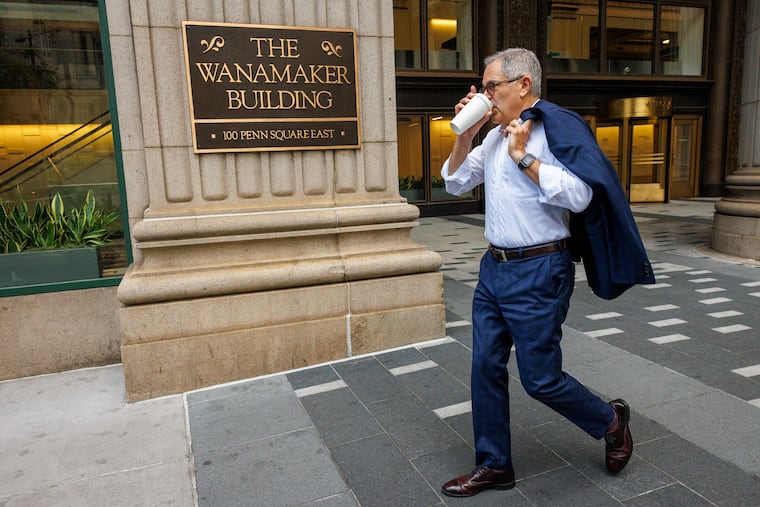District Attorney Larry Krasner reports for (jury) duty
Inside City Hall Courtroom 643 on Thursday, District Attorney Larry Krasner was simply juror No. 18.

He is one of the most important officials in one of the nation’s busiest court systems.
His name will appear on the ballot next spring.
But beneath the unflattering glow of fluorescent lights inside City Hall’s Courtroom 643 on Thursday, he was simply juror No. 18.
“Lawrence S. Krasner,” the man uttered into the microphone, the announcement barely registering to a crowd of people nearly dozing off. “You’re juror number 18, Mr. Krasner.”
With that, a yellow juror badge was plastered onto the left side of the Philadelphia district attorney’s crisp white button-down shirt, and he was shuttled into the humid, unairconditioned hallways with 40 of his peers.
He was the only person with a personal security detail. And yet if anyone noticed, few seemed to care.
Only one woman, juror No. 2, appeared to recognize him. She stood behind him and pointed toward his back with glee.
“I feel special!” she said with a laugh.
She turned to juror No. 7 standing behind her, a woman in a floral dress.
“Do you recognize him?” she asked excitedly.
No. 7 looked annoyed.
“No,” she said with a shrug.
Krasner, a progressive prosecutor who has served as Philadelphia district attorney since 2017, didn’t have to show. A court employee had offered to dismiss him the day before. He said no.
“It’s important to do this,” he said.
Leaders of the city, state, and nation are often called to serve. Mayor Cherelle L. Parker was summoned to jury duty earlier this year, shortly after she took office, said a jury selection employee. She was assigned to a homicide case, but as soon as the judge spotted her in the crowd, she was told she could go.
In 2011, then-Vice President Joe Biden was called to jury duty in Delaware Superior Court, but was quickly dismissed. And Supreme Court Chief Justice John Roberts was summoned in Maryland in 2015, but was similarly not selected.
Krasner wasn’t let off the hook that easily.
He was called to appear in front of Common Pleas Court Judge John Padova Jr. in a civil case in which a patient at Thomas Jefferson University Hospital alleged that hospital security had assaulted him. It would be a five-day trial, Padova told prospective jurors.
One by one, he called jurors into the closed-door selection room to be asked whether they had a hardship — such as scheduled travel for the July 4 holiday, or a medical issue — or any personal biases or conflicts that could affect their ability to be impartial.
Juror No. 18 was the last to be called in before lunch.
“Mr. Krasner,” Padova said with a grin, thanking him for coming in. The attorneys on both sides of the case smiled awkwardly.
The attorneys acknowledged that they knew Krasner and that his wife, Lisa M. Rau, a former longtime judge in the city, had worked as a mediator for their law firms in the past.
One asked Krasner whether he had ever been a victim of a crime.
“I’ve been a victim of a few crimes,” the DA said. There were the bike and wallet thefts, the smashing of his car windows, the time two decades ago when a serial burglar broke into his home in Mount Airy and stole his computer and trinkets belonging to his kids.
But the most serious crime was about 15 years ago, he said, when he was mugged outside his office by two men, and slashed in the face with a razor blade. (It’s in his book, he often reminds reporters who ask about his past.)
The attorneys asked whether anything about that experience — or his previous career as a criminal defense lawyer or his job as the city’s top prosecutor — would make it difficult for him to render an impartial verdict.
“I think I can be totally impartial,” he told them.
He was released and asked to return after lunch. Good timing, he said. He could make the 1 p.m. homicide meeting at his office.
By 2:30 p.m., the jurors were ushered back inside room 643.
Juror No. 27 chewed his nails. No. 33 complained to No. 29 about the woes of being a teacher. Krasner silently scrolled on his phone. Finally, the lawyers returned to the courtroom. They called the numbers of the 13 selected jurors.
No. 18 wasn’t one of them.
Krasner returned to the humid hallway with the rest of the rejects. The court officer asked whether he wanted a slip to be excused from work.
He declined.
“I just wanna know who cut me,” he said. “I have a feeling who it was.”
He said he’d leave it at that.
He walked out of City Hall and returned to work. The $9 payment for his service should arrive within a few weeks.